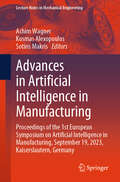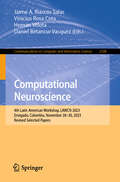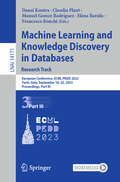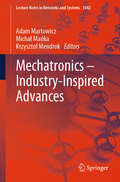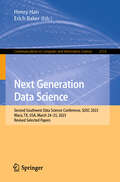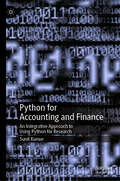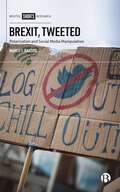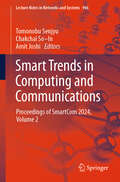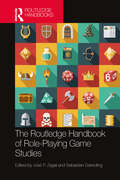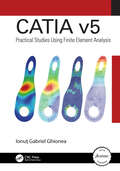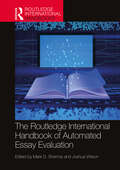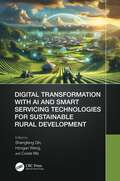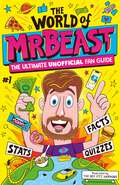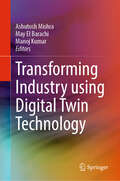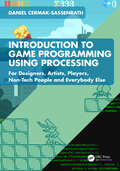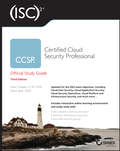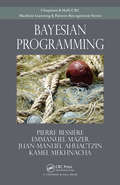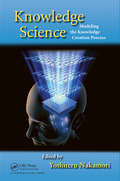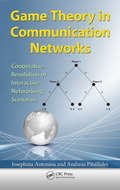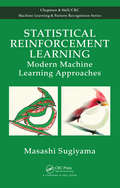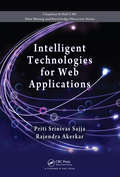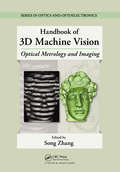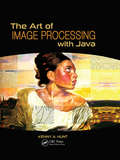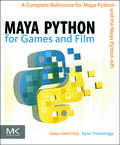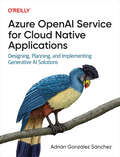- Table View
- List View
Advances in Artificial Intelligence in Manufacturing: Proceedings of the 1st European Symposium on Artificial Intelligence in Manufacturing, September 19, 2023, Kaiserslautern, Germany (Lecture Notes in Mechanical Engineering)
by Sotiris Makris Kosmas Alexopoulos Achim WagnerThis book reports on recent developments of artificial intelligence applications in the manufacturing industry. Gathering contributions to the first European Symposium on Artificial Intelligence in Manufacturing, held on September 19, 2023, in Kaiserslautern, Germany, it reports on machine learning models and algorithms for systems monitoring and industrial data management, on advances in human-robot collaboration, and on artificial intelligence applications in industrial control and process monitoring. Giving a special emphasis to the integration of artificial intelligence in manufacturing systems and processes, this book offers a timely and practice-oriented guide to a multidisciplinary audience of engineering researchers, software developers and industrial managers.
Computational Neuroscience: 4th Latin American Workshop, LAWCN 2023, Envigado, Colombia, November 28–30, 2023, Revised Selected Papers (Communications in Computer and Information Science #2108)
by Vinícius Rosa Cota Jaime A. Riascos Salas Hernán Villota Daniel Betancur VasquezThis book constitutes the refereed proceedings of the 4th Latin American Workshop, LAWCN 2023, held in Envigado, Colombia, during November 28–30, 2023. The 8 full papers and 2 short papers included in this book were carefully reviewed and selected from 50 submissions. They were organized in topical sections as follows: artificial intelligence and machine learning; computational neuroscience; and brain-computer interfaces.
Machine Learning and Knowledge Discovery in Databases: European Conference, ECML PKDD 2023, Turin, Italy, September 18–22, 2023, Proceedings, Part III (Lecture Notes in Computer Science #14171)
by Elena Baralis Francesco Bonchi Danai Koutra Claudia Plant Manuel Gomez RodriguezThe multi-volume set LNAI 14169 until 14175 constitutes the refereed proceedings of the European Conference on Machine Learning and Knowledge Discovery in Databases, ECML PKDD 2023, which took place in Turin, Italy, in September 2023.The 196 papers were selected from the 829 submissions for the Research Track, and 58 papers were selected from the 239 submissions for the Applied Data Science Track. The volumes are organized in topical sections as follows:Part I: Active Learning; Adversarial Machine Learning; Anomaly Detection; Applications; Bayesian Methods; Causality; Clustering.Part II: Computer Vision; Deep Learning; Fairness; Federated Learning; Few-shot learning; Generative Models; Graph Contrastive Learning.Part III: Graph Neural Networks; Graphs; Interpretability; Knowledge Graphs; Large-scale Learning.Part IV: Natural Language Processing; Neuro/Symbolic Learning; Optimization; Recommender Systems; Reinforcement Learning; Representation Learning.Part V: Robustness; Time Series; Transfer and Multitask Learning.Part VI: Applied Machine Learning; Computational Social Sciences; Finance; Hardware and Systems; Healthcare & Bioinformatics; Human-Computer Interaction; Recommendation and Information Retrieval.Part VII: Sustainability, Climate, and Environment.- Transportation & Urban Planning.- Demo.
Mechatronics – Industry-Inspired Advances (Lecture Notes in Networks and Systems #1042)
by Adam Martowicz Michał Mańka Krzysztof MendrokThis book addresses the key aspects concerning the rapid development of mechatronics. It also helps to understand the respective great significance of cooperation between researchers and professionals. Mechatronics is crucial for many areas of life. However, its invaluable contribution is particularly seen in the Fourth Industrial Revolution (Industry 4.0). In response to the current issues in mechatronics, the 6th International Conference Mechatronics 2023: Ideas for Industrial Applications was organized from 11 to 13 December 2023 in Krakow, Poland. The following topics were discussed: artificial intelligence, robotics, image processing, software, control systems, space applications, modeling and identification of mechatronic systems, smart materials, and prototype construction with 3D printing. This book provides the solutions ready for implementation in industry. These solutions grew out of the ideas exchange between the Conference attendees representing various backgrounds.
Next Generation Data Science: Second Southwest Data Science Conference, SDSC 2023, Waco, TX, USA, March 24–25, 2023, Revised Selected Papers (Communications in Computer and Information Science #2113)
by Henry Han Erich BakerThis book constitutes the refereed proceedings of the Sescond Southwest Data Science Conference, SDSC 2023, held in Waco, TX, USa, during March 24-25, 2023. The 16 full and 1 short paper included in this book were carefully reviewed and selected from 72 submissions. They were oragnized in topical sections named: Business social and foundation data science; and applied data science, artifiicial intelligence and data engineering.
Python for Accounting and Finance: An Integrative Approach to Using Python for Research
by Sunil KumarThis book is a comprehensive guide to the application of Python in accounting, finance, and other business disciplines. This book is more than a Python tutorial; it is an integrative approach to using Python for practical research in these fields. The book begins with an introduction to Python and its key libraries. It then covers real-world applications of Python, covering data acquisition, cleaning, exploratory data analysis, visualization, and advanced topics like natural language processing, machine learning, predictive analytics, and deep learning. What sets this book apart is its unique blend of theoretical knowledge and real-world examples, supplemented with ready-to-use code. It doesn't stop at the syntax; it shows how to apply Python to tackle actual analytical problems. The book uses case studies to illustrate how Python can enhance traditional research methods in accounting and finance, not only allowing the reader to gain a firm understanding of Pythonprogramming but also equipping them with the skills to apply Python to accounting, finance, and broader business research. Whether you are a PhD student, a professor, an industry professional, or a financial researcher, this book provides the key to unlocking the full potential of Python in research.
Brexit, Tweeted: Polarization and Social Media Manipulation
by Marco BastosDissecting 45 million tweets from the period that followed the Brexit referendum, this book presents an extensive analysis of social media manipulation. The book examines emerging changes in partisan politics, nationalist and populist values, as well as broader societal changes that are feeding into polarization and echo-chamber communication. It pulls the curtain back on the techniques employed to interfere with, and potentially distort, the public discussion. Making complex data accessible to non-technical audiences, this unique post-mortem of the Brexit referendum contributes to our understanding of social media disinformation in the UK and beyond.
Smart Trends in Computing and Communications: Proceedings of SmartCom 2024, Volume 2 (Lecture Notes in Networks and Systems #946)
by Amit Joshi Tomonobu Senjyu Chakchai So–InThis book gathers high-quality papers presented at the Eighth International Conference on Smart Trends in Computing and Communications (SmartCom 2024), organized by Global Knowledge Research Foundation (GR Foundation) from 12 to 13 January 2024 in Pune, India. It covers the state-of-the-art and emerging topics in information, computer communications, and effective strategies for their use in engineering and managerial applications. It also explores and discusses the latest technological advances in, and future directions for, information and knowledge computing and its applications.
The Routledge Handbook of Role-Playing Game Studies (Routledge Media and Cultural Studies Handbooks)
by Sebastian Deterding José P. ZagalThis Handbook provides a comprehensive guide to the latest research on role-playing games (RPGs) across disciplines, cultures, and media in one single, accessible volume.Collaboratively authored by more than 40 key scholars, it traces the history of RPGs, from wargaming precursors to tabletop RPGs like Dungeons & Dragons to the rise of live-action role-play and contemporary computer RPG and massively multiplayer online RPG franchises, like Baldur’s Gate, Genshin Impact, and World of Warcraft. Individual chapters survey the perspectives, concepts, and findings on RPGs from key disciplines, like performance studies, sociology, psychology, education, economics, game design, literary studies, and more. Other chapters integrate insights from RPG studies around broadly significant topics, like worldbuilding, immersion, and player-character relations, as well as explore actual play and streaming, diversity, equity, inclusion, jubensha, therapeutic uses of RPGs, and storygames, journaling games, and other forms of text-based RPGs. Each chapter includes definitions of key terms and recommended readings to help students and scholars new to RPG studies find their way into this interdisciplinary field.A comprehensive reference volume ideal for students and scholars of game studies and immersive experiences and those looking to learn more about the ever-growing, interdisciplinary field of RPG studies.
CATIA v5: Practical Studies Using Finite Element Analysis
by Ionuţ Gabriel GhioneaCATIA v5 is the world’s leading 3D CAD engineering and design software, used in a variety of industries to design, innovate, simulate, analyse and manufacture products. CATIA is taught at thousands of academic institutions around the globe to prepare today the great engineers of tomorrow.This book is more than an introduction to CATIA v5 Finite Element Analysis, providing a practical approach to the subject. The basic concepts of finite element analysis (FEA) in CATIA v5 are explained and augmented with examples and figures for a thorough understanding of the subjects.The book is intended to be used by students from programs with a mechanical or industrial engineering background, but also by design and control engineers from various industries (automotive, aerospace, military, heavy machinery, medical technology, etc.). These users need to work and verify their 3D parts and assemblies by applying various methods. Among them, the finite element method (FEM) is a very important tool because it provides information on how the stresses are distributed in the component parts, how the loads are applied and what are the values and orientations of the resulting displacements.All the content is organized in a logical manner, with chapters that cover both theoretical concepts and practical issues addressed through the use of modelling, assembly and FEA. The presented applications are clearly written and easy to understand, with step-by-step instructions and ample explanations, illustrations and figures. Many of the tutorials start from the beginning, including the parametric modelling of the part and the interpretation of FEM analysis results.From students to engineers, all are advised to open and follow the pages of this book with interest and perseverance, to patiently go through all the explanations of the presented tutorials, to explore the proposed FEM problems and then to successfully apply the knowledge acquired in their professional activities.
The Routledge International Handbook of Automated Essay Evaluation (Routledge International Handbooks)
by Joshua Wilson Mark D. ShermisThe Routledge International Handbook of Automated Essay Evaluation (AEE) is a definitive guide at the intersection of automation, artificial intelligence, and education. This volume encapsulates the ongoing advancement of AEE, reflecting its application in both large-scale and classroom-based assessments to support teaching and learning endeavors.It presents a comprehensive overview of AEE's current applications, including its extension into reading, speech, mathematics, and writing research; modern automated feedback systems; critical issues in automated evaluation such as psychometrics, fairness, bias, transparency, and validity; and the technological innovations that fuel current and future developments in this field. As AEE approaches a tipping point of global implementation, this Handbook stands as an essential resource, advocating for the conscientious adoption of AEE tools to enhance educational practices ethically. The Handbook will benefit readers by equipping them with the knowledge to thoughtfully integrate AEE, thereby enriching educational assessment, teaching, and learning worldwide.Aimed at researchers, educators, AEE developers, and policymakers, the Handbook is poised not only to chart the current landscape but also to stimulate scholarly discourse, define and inform best practices, and propel and guide future innovations.
Digital Transformation with AI and Smart Servicing Technologies for Sustainable Rural Development
by Shengfeng Qin Hongan Wang Cuixia MaThis book introduces and demonstrates the state-of-the art research and development in tackling sustainable urban and rural integration, supported by digitalization and digital transformation in rural areas with Industry 4.0/5.0 technologies. Digital Transformation with AI and Smart Servicing Technologies for Sustainable Rural Development is centered around how to deal with the sustainable urban and rural integration with advanced digital technologies such as artificial intelligence (AI), Big Data, Crowdsourcing, Crowdsensing and digital twin applications.Digital Transformation with AI and Smart Servicing Technologies for Sustainable Rural Development comes from the authors international collaborative projects funded by British Council and National Sciences Foundation of China and our Newton Prize Winning project founded by UK Department for Business, Energy & Industrial Strategy. It covers digital platform design with integrated crowdsourcing, crowdsensing and digital twin technologies for smart community services and governing. The authors discuss smart textile design for health and social care and VR/AR based tele-healthcare services for plants, livestock, and people. It also presents smart building technologies and integrated services for remote rural areas.This book will be a valuable reference for multidisciplinary researchers, policy makers, urban and rural development engineers, and university students to support their research and work in AI and smart technology applications.
The World of MrBeast: The Ultimate Unofficial Fan Guide Packed with Facts, Stats and Quizzes (The World Of #1)
by Catherine Saunders*THE ULTIMATE UNOFFICIAL MRBEAST FAN BOOK*Discover everything there is to know about MrBeast, the biggest YouTuber the world has ever known. Follow his journey from the early days of posting gaming videos from his bedroom, to becoming the viral, worldwide sensation that he is today. Whether he's building his very own Willy Wonka's Chocolate Factory and covering people in slime, or donating millions in aid to refugees, uncover the secrets behind MrBeast's most sensational giveaways, spectacular stunts, million-dollar challenges and the inspirational videos that are helping people around the world. Put your knowledge to the test with quick quizzes, impress your friends with the most amazing quotes, and discover record-breaking stellar stats that prove that Mr Beast is the internet's biggest star!*This book has not been authorised, licensed or endorsed by MrBeast or any associated entity, nor by anyone involved in the creation or production of the MrBeast YouTube channel.Buy this book if you're looking for:- gifts for boys and girls aged 8, 9, 10, 11- a book to get kids more interested in reading- a kid-favourite gift for birthdays, holidays or Christmas or summer holidays- a book that will inspire the biggest MrBeast and YouTuber fans in your life
Transforming Industry using Digital Twin Technology
by Manoj Kumar Ashutosh Mishra May El Barachi This book enables readers with varying backgrounds to understand the need for Digital Twin technologies. The authors describe how digital twin amounts to the convergence of the physical and the virtual worlds where each industrial process, asset, service, or product gets a digital replica and dynamic digital blueprint and representation, from the design phase to the deployment phase. Through this book, readers will be enabled to work on Digital Twin techniques and gain from experience. The book will provide a high level of understanding of the emerging technologies and why Digital Twin offers the potential of acquiring and processing a tremendous amount of data from the physical world.
Introduction to Game Programming using Processing: For Designers, Artists, Players, Non-Tech People and Everybody Else
by Daniel Cermak-SassenrathThis is an introductory textbook focusing on games (specifically interaction and graphics) as a pathway into programming. It empowers readers to do basic programming, prototyping, game creation, and other highly interactive applications, all from scratch and without any prior programming knowledge.Using the popular programming language Processing, this book describes, explains, and demonstrates the basic and general programming principles and mechanisms used in typical game algorithms and concrete game projects. Chapters cover basic graphics, text output, loops, data types and variables, movement, time, audio and sound, debugging, classes and objects, event-based programming, real-time input controls, computer speed compensation, animation, tiling, scrolling, collision detection, basic AI, and much more. Additional support materials such as code examples and demo programs are available to download from this book’s webpage.This book is a great resource for students and aspiring professionals looking for an approachable entry into game programming.
**Missing** (Sybex Study Guide)
by David Seidl Mike ChappleThe only official study guide for the new CCSP exam objectives effective from 2022-2025 (ISC)2 CCSP Certified Cloud Security Professional Official Study Guide, 3rd Edition is your ultimate resource for the CCSP exam. As the only official study guide reviewed and endorsed by (ISC)2, this guide helps you prepare faster and smarter with the Sybex study tools that include pre-test assessments that show you what you know, and areas you need further review. In this completely rewritten 3rd Edition, experienced cloud security professionals Mike Chapple and David Seidl use their extensive training and hands on skills to help you prepare for the CCSP exam. Objective maps, exercises, and chapter review questions help you gauge your progress along the way, and the Sybex interactive online learning environment includes access to a PDF glossary, hundreds of flashcards, and two complete practice exams. Covering all CCSP domains, this book walks you through Cloud Concepts, Architecture and Design, Cloud Data Security, Cloud Platform and Infrastructure Security, Cloud Application Security, Cloud Security Operations, and Legal, Risk, and Compliance with real-world scenarios to help you apply your skills along the way. The CCSP credential from (ISC)2 and the Cloud Security Alliance is designed to show employers that you have what it takes to keep their organization safe in the cloud. Learn the skills you need to be confident on exam day and beyond. Review 100% of all CCSP exam objectives Practice applying essential concepts and skills Access the industry-leading online study tool set Test your knowledge with bonus practice exams and moreAs organizations become increasingly reliant on cloud-based IT, the threat to data security looms larger. Employers are seeking qualified professionals with a proven cloud security skillset, and the CCSP credential brings your resume to the top of the pile. (ISC)2 CCSP Certified Cloud Security Professional Official Study Guide gives you the tools and information you need to earn that certification and apply your skills in a real-world setting.
Bayesian Programming (Chapman & Hall/CRC Machine Learning & Pattern Recognition)
by Pierre Bessiere Emmanuel Mazer Juan Ahuactzin Kamel MekhnachaA new modeling methodology, new inference algorithms, new programming languages, and new hardware are all needed to create a complete Bayesian computing framework. Focusing on the methodology and algorithms, this book describes the first steps toward reaching that goal. It emphasizes probability as an alternative to Boolean logic, covering new methods to build probabilistic programs for real-world applications. The book encourages readers to explore emerging areas and develop new programming languages and hardware architectures. A Python package is available on a supplementary website.
Knowledge Science: Modeling the Knowledge Creation Process
by Yoshiteru NakamoriExplaining how to improve our knowledge-based society, this book addresses problems in collecting, synthesizing, coordinating, and creating knowledge. It provides knowledge engineering tools and a framework for integrating knowledge creation, discovery, and management. The text covers knowledge technology, knowledge management, knowledge discovery and data mining, knowledge synthesis, knowledge justification, and knowledge construction. Experienced researchers in decision science, artificial intelligence, systems engineering, behavioral science, and management science present new methods for creating technological innovation from existing knowledge, such as IT techniques, organizational theory, and mathematical systems theory.
Game Theory in Communication Networks: Cooperative Resolution of Interactive Networking Scenarios
by Josephina Antoniou Andreas PitsillidesFocusing on heterogeneous networks, this book addresses important resource management and security issues found in networks and uses theoretical tools to model them. Although it explores network design and management from the perspective of game theory and graph theory, the text also provides practical solutions for each mechanism that needs improvement with a step-by-step approach. It also includes simulation code, so readers can use some or all of the proposed models for better network planning.
Statistical Reinforcement Learning: Modern Machine Learning Approaches (Chapman & Hall/CRC Machine Learning & Pattern Recognition)
by Masashi SugiyamaReinforcement learning (RL) is a framework for decision making in unknown environments based on a large amount of data. Several practical RL applications for business intelligence, plant control, and gaming have been successfully explored in recent years. Providing an accessible introduction to the field, this book covers model-based and model-free approaches, policy iteration, and policy search methods. It presents illustrative examples and state-of-the-art results, including dimensionality reduction in RL and risk-sensitive RL. The book provides a bridge between RL and data mining and machine learning research.
Intelligent Technologies for Web Applications
by Rajendra Akerkar Priti Srinivas SajjaThis reference presents both fundamental and advanced topics and related to Web operations. Using an integrated approach, the authors describe the basics as well as latest trends in the area. They cover agent-based Web, wrapper induction, Web mining, information retrieval, Web knowledge management, and social networks. The text includes a host of examples and over 100 illustrations that clarify complex material. It also contains many bibliographical notes, end-of-chapter exercises, glossaries, and practice questions with solutions/hints.
Handbook of 3D Machine Vision: Optical Metrology and Imaging (Series in Optics and Optoelectronics)
by Song ZhangChoosing from the numerous 3D vision methods available can be frustrating for scientists and engineers, especially without a comprehensive resource to consult. Filling this gap, this handbook gives an in-depth look at the most popular 3D imaging techniques. Written by key players in the field and inventors of important imaging technologies, it helps you understand the core of 3D imaging technology and choose the proper 3D imaging technique for your needs. For each technique, the book provides its mathematical foundations, summarizes its successful applications, and discusses its limitations.
The Art of Image Processing with Java
by Kenny A. HuntThis introductory image processing text is ideal for college students studying computer science or software engineering. With an emphasis on software design, the text builds on an accessible mathematical foundation and on extensive sample Java code to teach students the fundamentals of image processing. The text is accompanied by rich illustrations that demonstrate the results of performing processing on famous art pieces. This approach gives readers real-world examples of ways they may use image processing. Each chapter includes problems for students, and an online supplement offers instructor resources.
Maya Python for Games and Film: A Complete Reference for the Maya Python API
by Adam Mechtley Ryan TrowbridgeThis book is among the first books to provide an in-depth look at how to implement Python with Maya,. It is an ideal resource for technical artists looking to boost productivity and enhance performance and interoperability. With this practical guide written by trusted authorities in the field, experienced technical artists will make the transition from the older MEL scripting language to Python and aspiring artists will save themselves time right from the beginning.
Azure OpenAI Service for Cloud Native Applications
by Adrián González SánchezGet the details, examples, and best practices you need to build generative AI applications, services, and solutions using the power of Azure OpenAI Service. With this comprehensive guide, Microsoft AI specialist Adrián González Sánchez examines the integration and utilization of Azure OpenAI Service—using powerful generative AI models such as GPT-4 and GPT-4o—within the Microsoft Azure cloud computing platform.To guide you through the technical details of using Azure OpenAI Service, this book shows you how to set up the necessary Azure resources, prepare end-to-end architectures, work with APIs, manage costs and usage, handle data privacy and security, and optimize performance. You'll learn various use cases where Azure OpenAI Service models can be applied, and get valuable insights from some of the most relevant AI and cloud experts.Ideal for software and cloud developers, product managers, architects, and engineers, as well as cloud-enabled data scientists, this book will help you:Learn how to implement cloud native applications with Azure OpenAI ServiceDeploy, customize, and integrate Azure OpenAI Service with your applicationsCustomize large language models and orchestrate knowledge with company-owned dataUse advanced roadmaps to plan your generative AI projectEstimate cost and plan generative AI implementations for adopter companies
